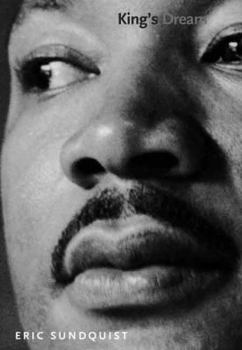Book Overview
Now available in paperback, one of the best short books we have on the ideas of racial equality (George Bornstein, "Times Literary Supplement")In this assessment of Martin Luther King, Jr. s famous... This description may be from another edition of this product.
Format:Hardcover
Language:English
ISBN:0300118074
ISBN13:9780300118070
Release Date:January 2009
Publisher:Yale University Press
Length:295 Pages
Weight:1.05 lbs.
Dimensions:1.1" x 5.9" x 8.3"
Customer Reviews
3 ratings
Martin Luther King and the American Dream
Published by Thriftbooks.com User , 14 years ago
In his speech delivered at the Lincoln Memorial during the August 28, 1963, March on Washington, Dr. Martin Luther King inspired the nation with his words "I have a dream." King's speech has been described as the best political speech of the Twentieth Century. High school students are able to identify the source of the phrase "I have a dream" much more consistently than they are able to identify the opening words of the Gettysburg Address or the Declaration of Independence. In his stunning and eloquent language, King disregarded the final third of the prepared text of his speech and spoke from his heart. As King himself latter recounted the origin of the speech: "I started out reading the speech ... all of a sudden this thing came out of me that I have used - I'd used it many times before, that thing about `I have a dream' - and I just felt that I wanted to use it here. I don't know why, I hadn't thought about it before the speech." (Quoted in Sundquist, p. 14) Eric Sundquist's recent book "King's Dream" (2009) is a meditation on this, the most famous speech of Martin Luther King. The goal of the study is to help understand the nature of King's dream and its continuing vitality. As with most writing of depth, King's speech has been appropriated for many purposes. With time and with the speech's iconic character, it has been commercialized and too-often trivialized and sentimentalized. It is a worthy goal to take a close look at the speech. Sundquist does not offer a line-by-line commentary on King's words, although such an approach might prove useful in another book. Rather, Sundquist tries to place King's speech in context by reading the text and by moving both forward and back to discuss its historical and cultural significance. (Introduction, p. 12) Sundquist is the UCLA Foundation Professor of Literature, and he has written widely on American literature and culture. The best way to read this book is to begin with Sundquist's introduction and then to turn to the text of King's speech itself, which is given as an Appendix to the book. This approach will allow the reader to focus closely on King's speech as a whole before turning to Sundquist's discussion. In this way, the reader may think through some of the poetical and important thoughts of King, both those in the "I have a dream" section of the speech and earlier. Some of the phrases and themes in the speech that Sundquist explores are as follows. From the prepared text: "In a sense we've come to our nation's capital to cash a check. When the architects of our republic wrote the magnificent words of the Constitution and the Declaration of Independence, they were signing a promissory note to which every American was to fall heir." "We have also come to this hallowed spot to remind America of the fierce urgency of now.... Now is the time to lift our nation from the quicksands of racial injustice to the solid rock of brotherhood. Now is the time to make justice a reality for
An Timely Analysis of a Great Speech
Published by Thriftbooks.com User , 15 years ago
The inauguration of Barack Obama provides an occasion to review the role of great oratory in America's public life. This fascinating and readable volume brings to life the origins, meaning, and consequences of the address which is better known than any other--Martin Luther King, Jr.'s "I have a dream" speech. It joins Gary Wills' "Lincoln at Gettysburg" Lincoln at Gettysburg: The Words that Remade America (Simon & Schuster Lincoln Library) and Ronald White's "Lincoln's Greatest Speech" Lincoln's Greatest Speech: The Second Inaugural as exemplars of the genre. In his last sermon, shortly before he was killed, King said, "I have seen the promised land. I may not get there with you. But I want you to know tonight, that we, as a people, will get to the promised land." Like Moses, King saw the promised land only from a distance. Obama has called his generation the "Joshua generation," the generation that followed Moses and led the people into the promised land. Obama's analogy is insightful and accurate. Without Lincoln and King, and without the speech chronicled here, Obama--and our country--would not be where they are today.
Literary and political analysis of historical and great American speech
Published by Thriftbooks.com User , 15 years ago
On August 28, 1963 Martin Luther King made , what is arguably, the greatest American political speech of the twentieth- century. In this work the literary and political background to the speech is analyzed. There is also analysis of the subsequent historical and political use made of the speech. King 's monumental speech was rich in the cadences of the Biblical prophets, and had two great turning moments. One was when he improvised the whole 'I have a dream' section. In this he articulated the American values of Justice and Freedom in a remarkably powerful way He concluded the speech by reciting 'My Country Tis of Thee' and taking the line ' Let Freedom Ring' and building with it to an another powerful all- encompassing statement of fundamental American ideals.





